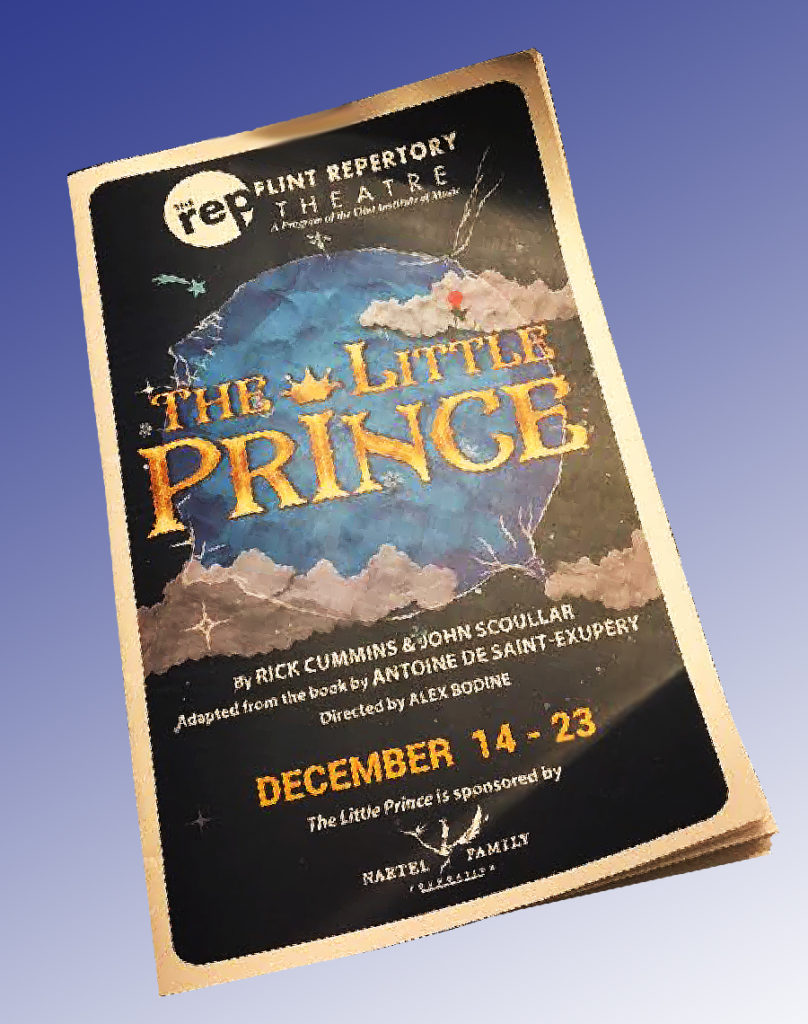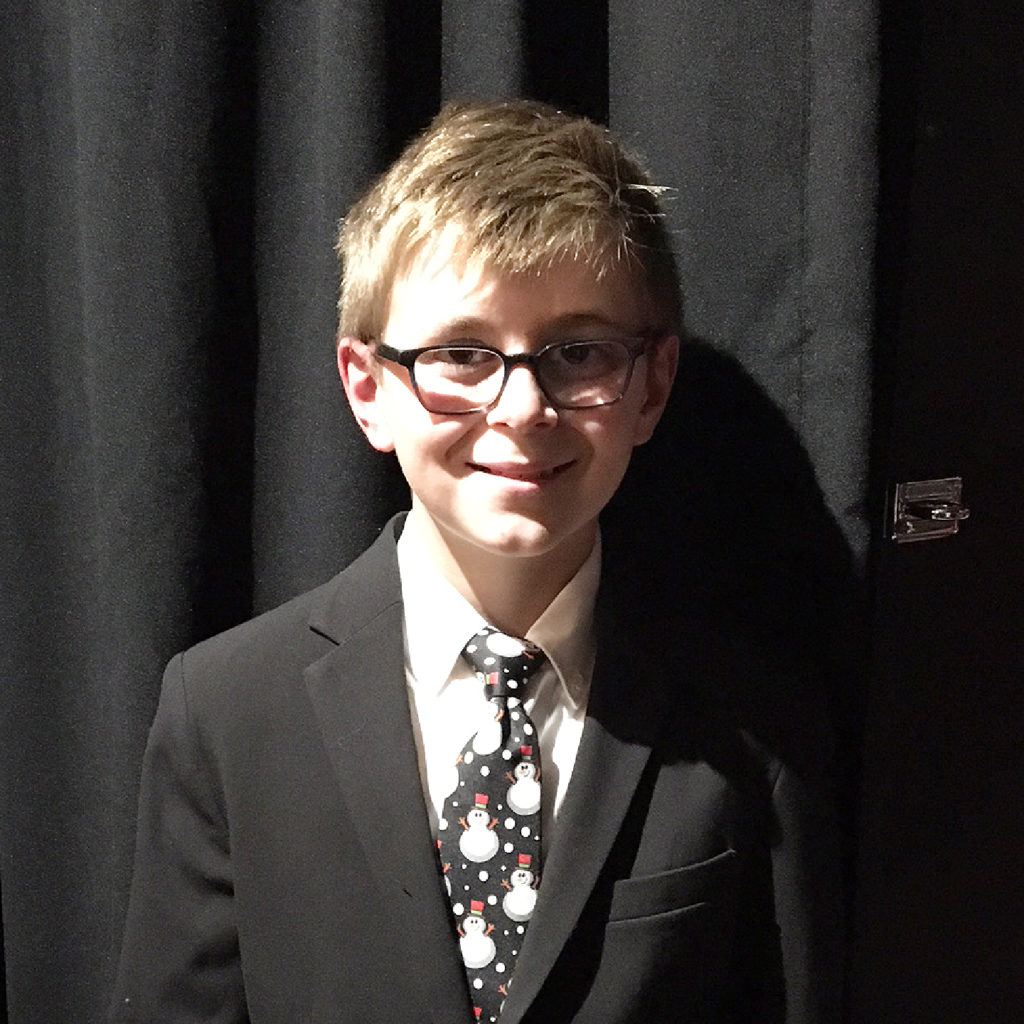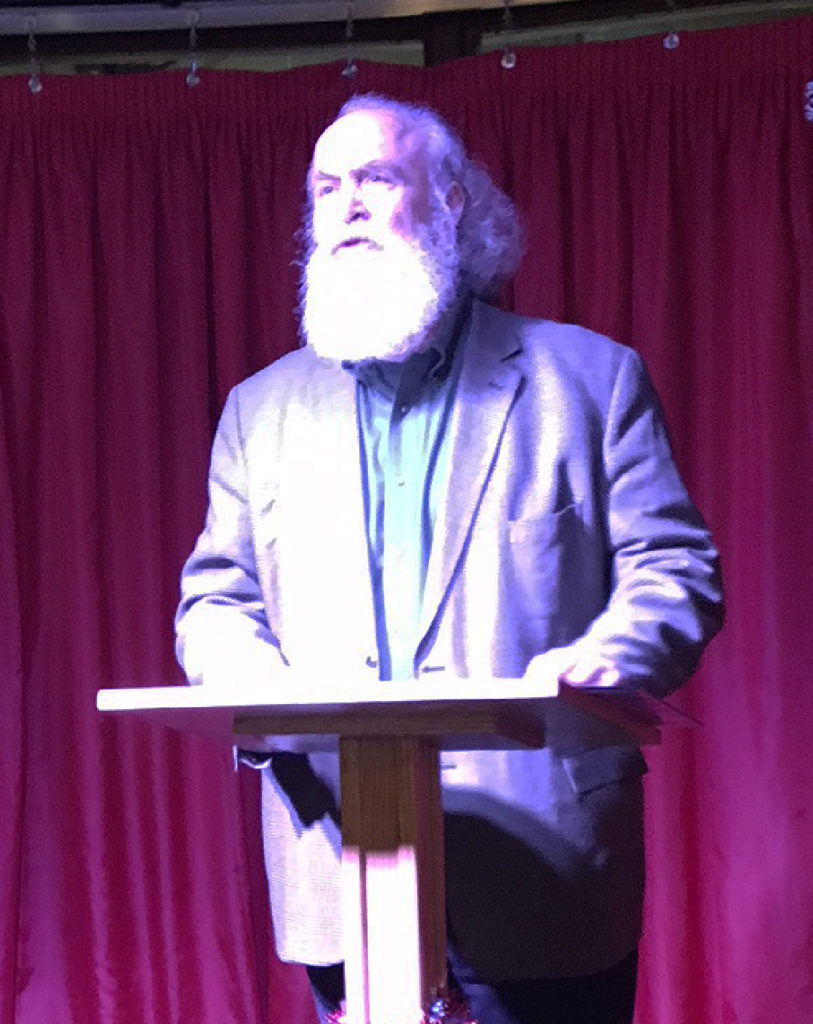By Patsy Isenberg
The stage version of “The Little Prince,” written by Rick Cummins and John Scoullar based on the beloved children’s book by French author Antoine de Saint-Exupéry, closed Dec. 23 after a successful run at the Flint Repertory Theater.
The Rep’s execution of the endearing play, with only four characters, featured deft direction, excellent acting, evocative set design, and haunting sound effects.
 Though it has been 75 years since the book was published, the themes of “The Little Prince” feel very current, exploring matters of open mindedness, being “tamed,” love, friendship, trust, and hope–they’re all there. The story, about a stranded aviator’s encounter with a small “prince” trying to get back to his home planet, suggests a child can teach an adult lessons in life as well as the heart.
Though it has been 75 years since the book was published, the themes of “The Little Prince” feel very current, exploring matters of open mindedness, being “tamed,” love, friendship, trust, and hope–they’re all there. The story, about a stranded aviator’s encounter with a small “prince” trying to get back to his home planet, suggests a child can teach an adult lessons in life as well as the heart.
The performance was staged at the F. A. Bower Theater in The Rep building at 1220 E. Kearsley St. The Bower Theater is in the front of the building which also includes the Elgood Theater often used by the former Flint Youth Theater that lends itself most often to “theater in the round.” The Bower has a separate entrance, and is a traditional raised stage.
It made sense to perform “Prince” on a traditional stage because of all that went on behind the stage. Designed by Andrew Licout from New York City, the set was quite abstract and in muted colors. Since the scenes mostly took place in the Sahara Desert, the grayish cloth backdrop was useful for indicating wind and shadows, and also made all the action and anything colorful or bright stand out. Set pieces are very abstract, simple, and modern. For example the plane which crashes in the beginning of the play is just a geometric metal structure that the actors climb on.
Visual effects and unusual sounds work well with the austere set to create a mood which a couple of theatergoers described as “strange.” Two “non-human” characters perform silent acrobatics and strike poses, combining their bodies to cast complex shadows onto the backdrop representing some of the dialog the human characters speak.
Stars, an important symbol of the story, are indicated with multiple garlands of string hanging at random heights above and to the front of the stage. But the best visual comes at the end when the cloth backdrop disappears, revealing levels of mirrors and amber lights that hang vertically as the prince walks away. Stringed instruments play unidentifiable melodies occasionally, along with tinkling bells and some intrusive electronic “music.” All of these effects combine to give an ethereal quality to the whole production.
The story begins with the aviator crashing his plane in the Sahara Desert. He laments his predicament of how to repair the plane, get enough food and water to survive, and begins to remember what it felt like to be a child.
Soon a mysterious child approaches him and seems only to answer the Aviator’s questions with another question. At first the aviator is exasperated by the prince’s refusal to give any information about himself.
Gradually other characters show up and the prince goes away from time to time, visiting other planets. The prince meets a snake who claims to be able to help get the him home to his own tiny planet. The aviator begins to miss the prince during his absences and realizes they’ve become friends.
On one journey the prince meets a red rose who he admires greatly but isn’t sure he can trust. He also meets a snake and a fox. The fox wants to be tamed so he and the prince work on that. Various lessons are learned and shared among the characters throughout the play.
There are only four cast members in the play.
The aviator was played by Brandon A. Wright who previously held the role of Robin Hood in “The Adventures of Robin Hood” at The Rep. Originally from Newark, New Jersey, he currently lives in Chicago. Wrightreceived his MFA in Acting from Wayne State University.He says he “is grateful to God, and thanks family & friends for continued support.” Wright was onstage almost constantly and his role was also considered the narrator.

Dalton Hartwell (Photo by Patsy Isenberg)
The child prince was played by Davison Community School fifth grader, Dalton Hartwell. Dalton “played the role of Bobby in the musical “The Geranium On the Windowsill Just Died, But Teacher You Went Right On” last spring for Flint Youth Theatre. Dalton was nominated for two Wilde Awards for his acting in that production.
He says he’s “very excited and thankful to be working with the incredibly talented actors, director and crew of ‘The Little Prince.’” He responded to EVM’s comment about how many lines he had to memorize for this role in “The Little Prince” with a smile, a sigh and an eye roll. His mother standing nearby agreed wholeheartedly. Dalton was wonderful as “The Little Prince.”
Emily Hart-Lopez is originally from Charleston, South Carolina and played the role of the Rose and the Snake. Based in New York City, she is new to acting but according to the program has done numerous performances in many genres of dance and acrobatics as well as recent acting as Disco Diva in “Roller Dynasty” and a short film, “Victoria.” Hart-Lopez also teaches dance and fitness and “recently taught at the Shanti Bhavan Children’s Project in India.” She says “she is honored to be joining Flint Repertory Theatre.”
The roles of Fox and Men on Planets were played by Josh Popa. He is a graduate of University of North Carolina School of the Arts (UNSCA). According to the program, Popa has played the role of Romeo in “Romeo and Juliet” for The Brick Theater. He was also cast as Andrew in “Spike Heels” at Loft 227 and was a mover in “Beast’s Beauty” at Lincoln Center. Based in New York City, Pops says of his role in “The Little Prince” that it’s important that “the inner child is something that should stay alive in each of us.”
Much credit should be given to the director, Alex Bodine, for his unusual visual and symbolic concepts. Bodine, also a graduate of UNCSA, is described in the program as exploring “surrealistic, dreamlike playscapes that transport the audience to a new world.” He also lives in New York City and according to the program “wears the multiple hats of director actor, choreographer and teacher.”
After the play Dec. 21 everyone was invited to the lobby of the Elgood Theatre for a holiday party. Several local performers sang Christmas music accompanied on keyboards by Rafeal D. McDaniel. Young Dalton Hartwell was one of the singers, along with three UM-Flint students.
Jason Briggs, who played assassin Charles Guiteau in the musical “Assassins” in November, organized the party. He invited local actor and poet Michael Kelly, recently retired from an executive position at Mott Community College, to speak at the event.

Michael Kelly: “Flint tamed me, but I wasn’t able to tame Flint.” (Photo by Patsy Isenberg)
Kelly talked about growing up, being educated and working in the arts in Flint. He also addressed some of the themes in “The Little Prince” — being tamed, for one. He suggested the idea of being tamed made him think about the effect of Flint itself. Kelly said that Flint tamed him, but that he wasn’t able to tame Flint.
If Kelly’s right, perhaps that suggests The Rep’s selection of “The Little Prince” was more custom-designed for their tame-able Flint audiences than the front office ever could have guessed.
Next up for The Rep will be the three-day “New Works Festival” beginning Jan. 18. After that The Rep will present “The Wolves” a play about an elite teenage girls’ soccer team as they go through a season. The play was a finalist for the 2017 Pulitzer Prize for Drama. The New York Timessaid, “This scary, exhilarating brightness of raw adolescence emanates from every scene of this uncannily assured first play by Sarah DeLappe.” That one opens on Feb. 8. For tickets visit www.flintrep.org, call The Rep at 810-237-1530 or The Ticket Center at 810-237-7333.


You must be logged in to post a comment.